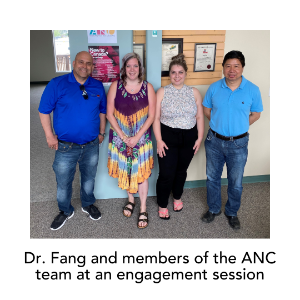Listening and Learning: Collaboration Connects Newcomers and Communities
"If it’s all ‘same old, same old’, it’s not interesting,” says Dr. Tony Fang. “It’s people coming in with different cultures, different kinds of food, different kinds of lifestyle, different kinds of music… it all makes this place more interesting, more dynamic, more vibrant.”
He’s talking about the impact of immigration on life in Newfoundland and Labrador, but his thoughts could also apply to university research: new ideas, new voices, and new collaborations can lead to great things, both in communities and in research. To affect and be affected by the social, political, and cultural forces of the world — to be relevant — researchers need to listen to, develop their understanding of, and interact with partners in the community. That kind of connection has been vital to Fang’s most recent projects.
"Recent research has identified employment experiences as one of the key determining factors in newcomers’ decision to stay in the province or move elsewhere,” says Dr. Fang, the Stephen Jarislowsky Chair in Cultural and Economic Transformation in Memorial’s Department of Economics, and a member of the World Bank's Expert Advisory Committee on Migration and Development. “For many immigrants, obtaining employment that is commensurate with their skill level is challenging for several reasons, including a lack of recognition of past work experience outside of Canada, and issues related to foreign credential recognition.” For Dr. Fang, a lack of connection to local social networks was an issue central to the problems facing immigrants in the province, and to his own work.

It was through that need for connection that Dr. Fang’s partnership with the Association for New Canadians (ANC) was formed. ANC is the largest and oldest federally funded immigrant settlement agency in Newfoundland and Labrador, and has been operating for over 40 years, supporting settlement, language, and employment needs of newcomers arriving in this province. The ANC supports both permanent and temporary residents throughout the province and has established satellite offices across the province. “In addition, the ANC works to support immigration and reduce access barriers, in part, by offering diversity and anti-racism training for schools, post-secondary institutions, employers and community groups,” Meaghan Philpott, Manager of Diversity, Public Education and Partnerships with ANC. “The ultimate goal of the ANC’s work is to help facilitate a welcoming environment for all newcomers to the province.”
Their current partnership, funded through Memorial’s Office of Public Engagement’s Public Engagement Accelerator Fund, is titled “Developing Better Understandings of the Integration Needs of the Newcomers in the NL Labour Market: A Public Engagement Project”. The research project is the partial culmination of five years of research collaboration between Dr. Fang and ANC to study the quantifiable impact of immigration on the economy in the Atlantic region.
"My goal has been to shift the conversation around immigration to encourage policies that increase the attraction of immigrants, as well as to build welcoming communities to help retain newcomers,” says Fang.
For ANC, the success of the project is a matter of choosing the right partner. “The best partnerships are ones where there is a common goal and both parties bring their expertise and experience to the table to reach this goal — that is the relationship that ANC has with Dr. Tony Fang,” says Philpott.
“As an agency whose main role is the successful settlement of newcomers, research is vital to the work we do on a daily basis,” says Philpott. "Not only does research inform program development, but it also helps to ensure those employees involved in direct program delivery remain abreast of key research in the settlement and immigration sector.”
In return, researchers have a lot to gain from partnerships with the community. “The ANC offers researchers practical settlement knowledge and access to newcomers, whose lived experiences are vital to any research on immigration,” says Philpott. “Community agencies intimately know the opportunities and challenges within their sectors, and can connect researchers with the knowledge and resources needed to conduct appropriate, valuable, and accurate research. That is the mandate of MUN's public engagement funding: to ensure that the research happening at Memorial directly and positively impacts the province.”
"Memorial and the ANC are well suited to collaborate on the research as partners because the two organizations possess complementary strengths and advantages,” says Dr. Fang.
Dr. Fang’s team at Memorial is made up of researchers and students from various fields of studies including Economics, Sociology, Management, Labour Studies, and Public Policy. “The Jarislowsky team has committed to immigration research, especially in the areas of the social and economic integration of newcomers in the region,” says Dr. Fang. “The research team has collaborated with well-established migration scholars and policy makers both in Atlantic Canada, across the country, and around the world.”
By working with the ANC as a research partner, Memorial University researchers and students are benefitting from the project, as well. “The ANC can help organize various public consultations, focus group discussions and interviews on economic contributions by immigrants, while the Jarislowsky team can conduct macroeconomic analysis, collect and analyze field data, and prepare policy-relevant reports and other materials for public engagement and knowledge mobilization,” says Dr. Fang.
Given the ongoing COVID-19 pandemic, the challenges to the economy, and the changing sentiments towards immigration in various parts of the world, Dr. Fang says it is more important than ever to provide convincing evidence on the social and economic benefits of immigration to contribute to the public discussion and debate on immigration issues and support evidence-based immigration policies and immigrant integration programs.
“I have the passion to achieve this common goal, along with ANC,” says Dr. Fang. “To achieve this common goal of economic success, and also, at the same time, multiculturalism, diversity and innovation in the province… it makes this place a more interesting place to live, and to work.”